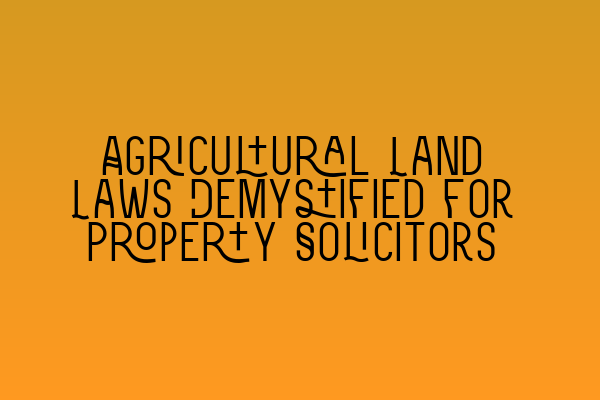Agricultural Land Laws Demystified for Property Solicitors
As a property solicitor, it is essential to have a comprehensive understanding of agricultural land laws. Many clients seeking legal advice in the field of agricultural property may be unfamiliar with the complexities of these laws. Therefore, it is crucial for you to be well-versed in this area in order to provide effective guidance and assistance.
In this blog post, we will demystify agricultural land laws, providing you with a clear and concise overview of the key aspects that property solicitors should be aware of. This will enable you to better serve your clients and establish yourself as a trusted advisor in the field of agricultural property law.
1. Introduction to Agricultural Land Laws
Agricultural land laws encompass a wide range of legal principles and regulations that govern the ownership, use, and transactions involving agricultural properties. These laws include aspects of property law, contract law, planning law, and environmental law, among others.
It is important to note that agricultural land laws vary from country to country and region to region. Therefore, it is crucial for property solicitors to familiarize themselves with the specific laws and regulations applicable in their jurisdiction.
2. Agricultural Tenancies
One of the key areas of agricultural land laws is agricultural tenancies. Agricultural tenancies define the legal relationship between landowners and occupiers when it comes to agricultural properties. They govern issues such as rent, rights and obligations of both parties, agricultural holdings, and termination of tenancies.
Understanding the various forms of agricultural tenancies, such as farm business tenancies and agricultural holdings, is fundamental for property solicitors. Familiarity with the relevant legislation and case law is essential in order to provide accurate advice to clients regarding their rights and responsibilities.
To deepen your understanding of this topic, you may find our article on SQE 1 Practice Exam Questions helpful.
3. Planning and Development
Another crucial aspect of agricultural land laws relates to planning and development. Agricultural properties often have unique planning and development restrictions due to their rural nature and the need to protect agricultural land for food production.
Property solicitors should be familiar with the planning permissions required for agricultural developments, as well as any permitted development rights that may apply. Furthermore, understanding the various environmental regulations and considerations is essential when advising clients on potential land use changes or development projects.
If you want to further enhance your knowledge in this area, make sure to check out our article on SQE 1 Practice Mocks FLK1 FLK2.
4. Common Agricultural Policy (CAP)
The Common Agricultural Policy (CAP) is an important aspect of agricultural land laws in certain jurisdictions, particularly within the European Union. The CAP sets out the agricultural subsidies and support mechanisms provided to farmers and landowners.
Property solicitors should have a basic understanding of the CAP in order to advise clients on the potential financial implications of agricultural land ownership and use. Additionally, staying up to date with changes in CAP policies and regulations is crucial to provide accurate advice.
If you’re interested in exploring this topic further, our article on SQE 2 Preparation Courses may provide you with valuable insights.
5. Land Sales and Acquisitions
Finally, property solicitors specializing in agricultural land laws should be knowledgeable in the area of land sales and acquisitions. Negotiating and drafting contracts for the purchase, sale, or leasing of agricultural properties requires an understanding of the specific considerations and legal implications associated with such transactions.
Property solicitors should be familiar with relevant contract law principles, as well as any specific regulations governing agricultural land transactions. Aspects such as payment terms, transfer of subsidies, and restrictive covenants are just a few examples of the key elements to consider when dealing with agricultural land sales and acquisitions.
To stay informed about upcoming SRA SQE exam dates and how to best prepare for them, you may want to check out our article on SRA SQE Exam Dates.
Conclusion
Understanding agricultural land laws is fundamental for property solicitors looking to provide effective legal advice and services in the realm of agricultural property. By developing a comprehensive understanding of the key areas discussed in this article, you will be better equipped to navigate the complexities of agricultural land laws, establish yourself as a reputable advisor, and ultimately serve your clients’ needs more effectively.
For further resources and courses related to SQE preparation and property law, visit our website SQE 1 Preparation Courses. Our expert team is dedicated to helping you succeed in your legal career.
